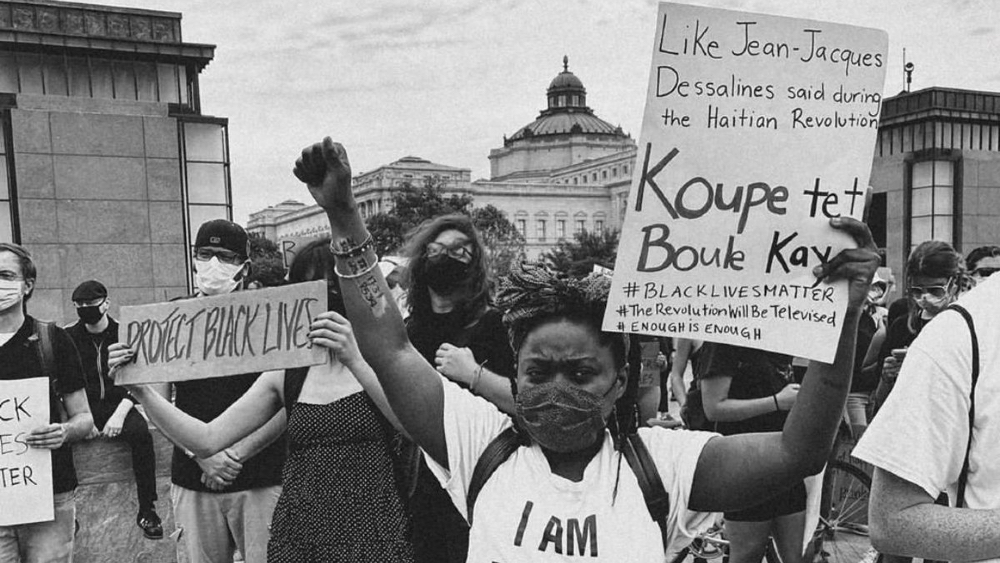If you’re interested in sharing your opinion on any cultural, political or personal topic, create an account here and check out our how-to post to learn more.
____
We found ourselves discussing yet another incident of police brutality on the last day of Haitian Heritage Month. And in the last few weeks, we’ve witnessed protests, the destruction of commercial property and the fed-uppedness (if this is a word) of the Black community and those who care about them. Not as oft-celebrated as Black History Month, Haitian Heritage Month is younger and captures a niche of a niche of the Black population. Though the history of Black people around the world is so deeply entwined with that of Haiti’s, no matter the incident — whether moments of joy, terror or, what most of us are probably feeling, an amalgamation of the emotional spectrum — our paths, our despair and our desire for liberation have always been and continue to be congruent.
Protests have been marched alongside “looting.” Dances have been danced, jokes have been made, marches have been marched and people were brutalized, pepper sprayed and protected all at the same time. The overlap of various aspects of normalcy could be likened to a twilight zone, where an innocent man is murdered, a part of us die with him and all the world watches in critique. While in an alternate universe, known as our everyday life, the world continues to do what the world does — goes on. While there have been efforts to unearth the legitimacy of our claims, we saw ourselves in ‘60s America, determining who is for us, knowing who is against us and side-eyeing anyone who dare reside in between.
And in the midst of it all, Haiti trended.
It trended because we also see ourselves in 18th century Haiti, where Haiti overthrew a colonial power and abolished slavery. Haiti won.
While Haiti stood tall as the first Black republic, the murder of white people in the newly founded country continues to be the favorite part of this tale. For many, it adds to the romanticization of the first Black nation-state. It lends toward the take no prisoners narrative of Haitian leaders, an imagination that positions Haitian heroes as more than heroic, but perfect, all knowing, unsympathetic and insightful. It also lent toward another, more familiar narrative — that Haitians were savages, barring and ignoring the barbarism cast upon the former slaves. Haiti was (and continues to be) highlighted as the quintessential dark place because, of course, the murder of white people denotes nothing less than savagery. But both narratives fail to tell the truth.
Fast forward to the present day, in the shadow of yet another tragedy (and another and another), Black people are being propped up as the angels or the devils. If they dance in the streets, they’re devils. If they take on an eternally depressed gait, they’re angels. We can’t simply be. And we see ourselves here again and again and again, trapped in an unrealistic binary with no real solutions to acquiring true liberation.
After the Haitian Revolution, Haiti found itself having to pick up metaphorical and literal pieces of war, anti-Blackness and oppression. The world denounced Haiti’s legitimacy and the world continues to do that to the movement toward equity in the United States. There’s a formula. Nevertheless, placards arise at protests referring to the feat, to the unimaginable, to the victory of autonomy over the perpetuation of white supremacy, which is also a part of the formula, looking to the wins but ignoring the lessons, thereby pretending they don’t exist.
The truth of it all is that this ill-written novel that we’re living, this poorly adapted movie we’re experiencing, has been carried out many times before and will most likely continue to be. But, Haiti gives us insight into how victory actually looks, how damning anti-Black sentiment can be after the metaphorical smoke settles. What is happening with these signs, Twitter conversations and the reference to our Haitian ancestors is the removal of humanity and reality, yet again, from Black people and Black movements. The world made sure Haiti suffered because of their victory on large and small scales. And because of this, there needs to be an understanding of the nuance of victory, the nuance of racism in every system imaginable. Entertain the nuance of the revolution. Use Haiti as a model.
We cannot cut out the pieces of the story that mark us as human, as though we are removing the fat from pork. Haiti lets us know what the world will do to you, what they will take from you and how they will tell your story. Haiti is a model for how to be strategic. Haiti murdered Frenchmen who were plotting to overthrow the new country — it was political; It wasn’t a fairytale. As we continue to fight for liberation in the United States, we must recall the nuance, the variance, the underbelly of Black hatred. Painting it as a copy and paste nursery rhyme won’t do.
Black death, police brutality and the disregard for Black life is something that is as normal (and unfortunate) as time. It comes in many intrinsic, covert ways. It comes in the “make-believe” and the fantasy. If you’re not careful, the history you’re aiming to replicate will be one that never happened.
